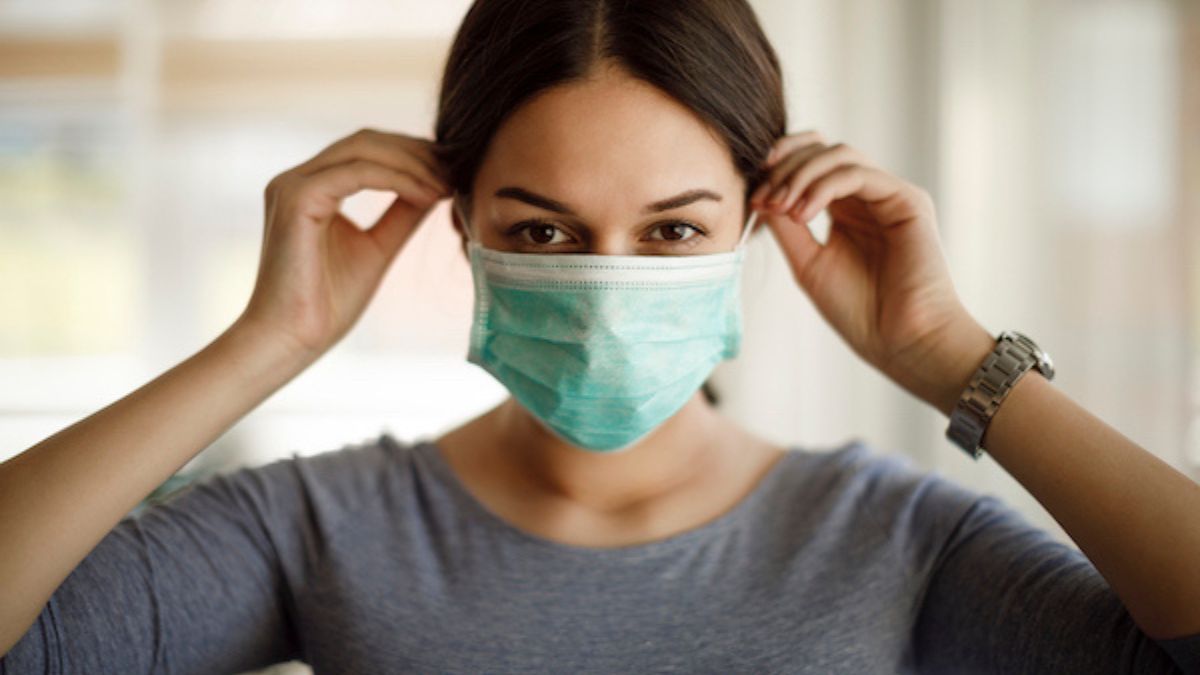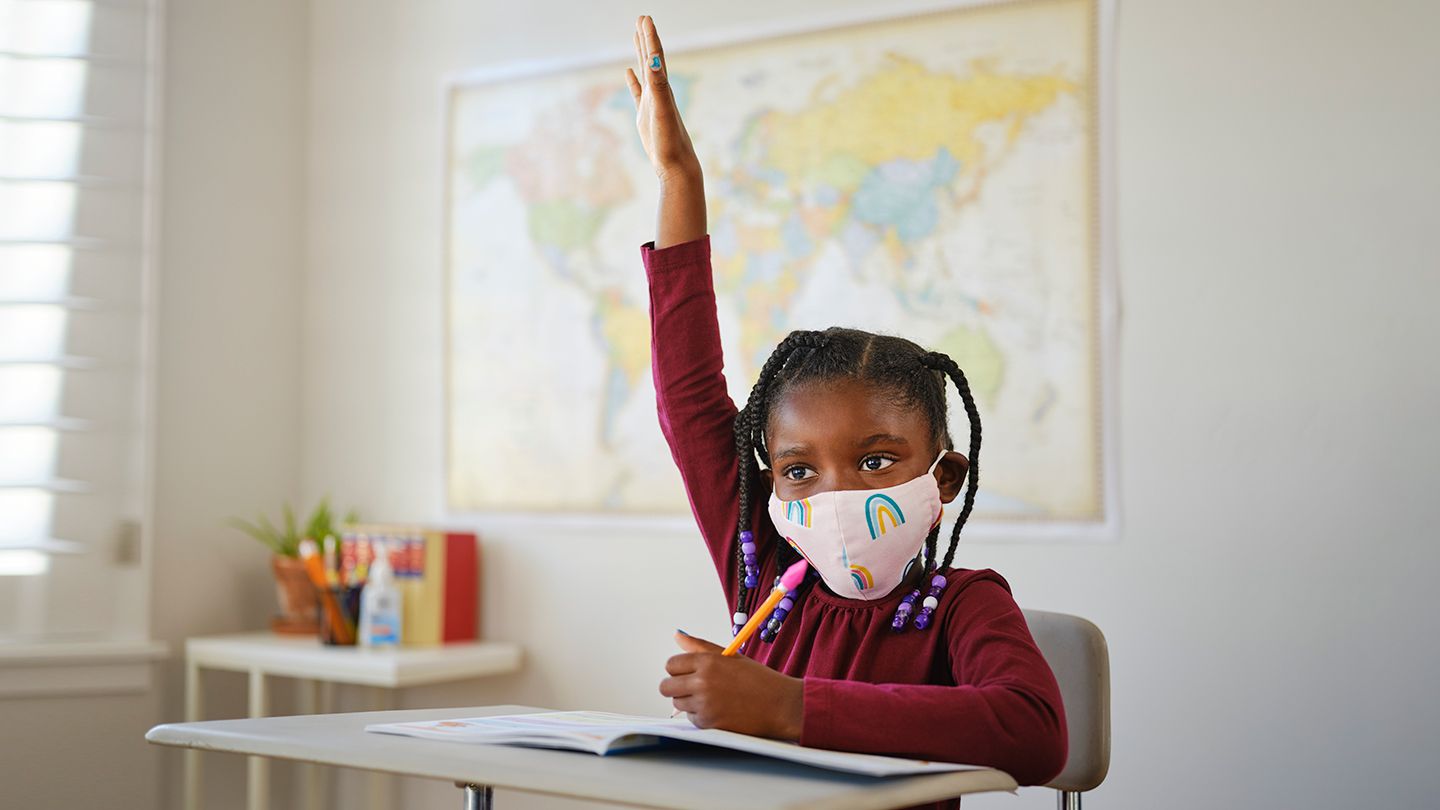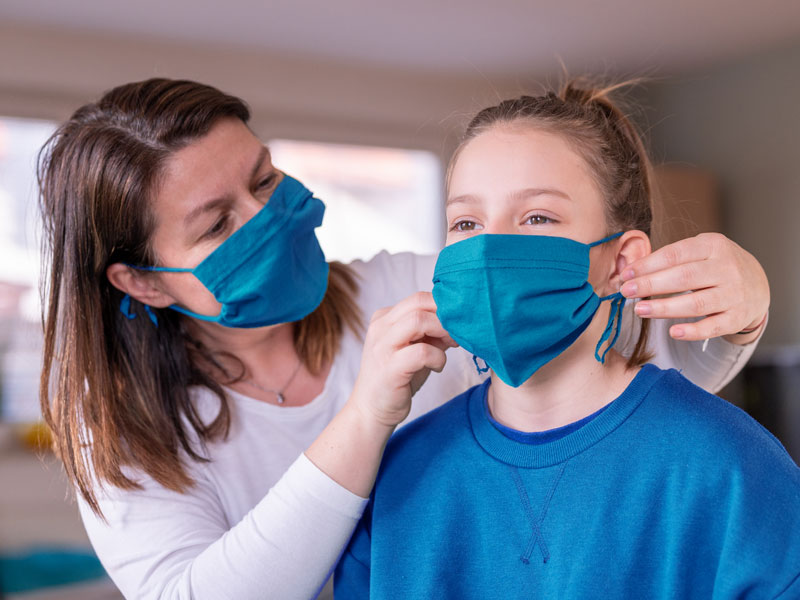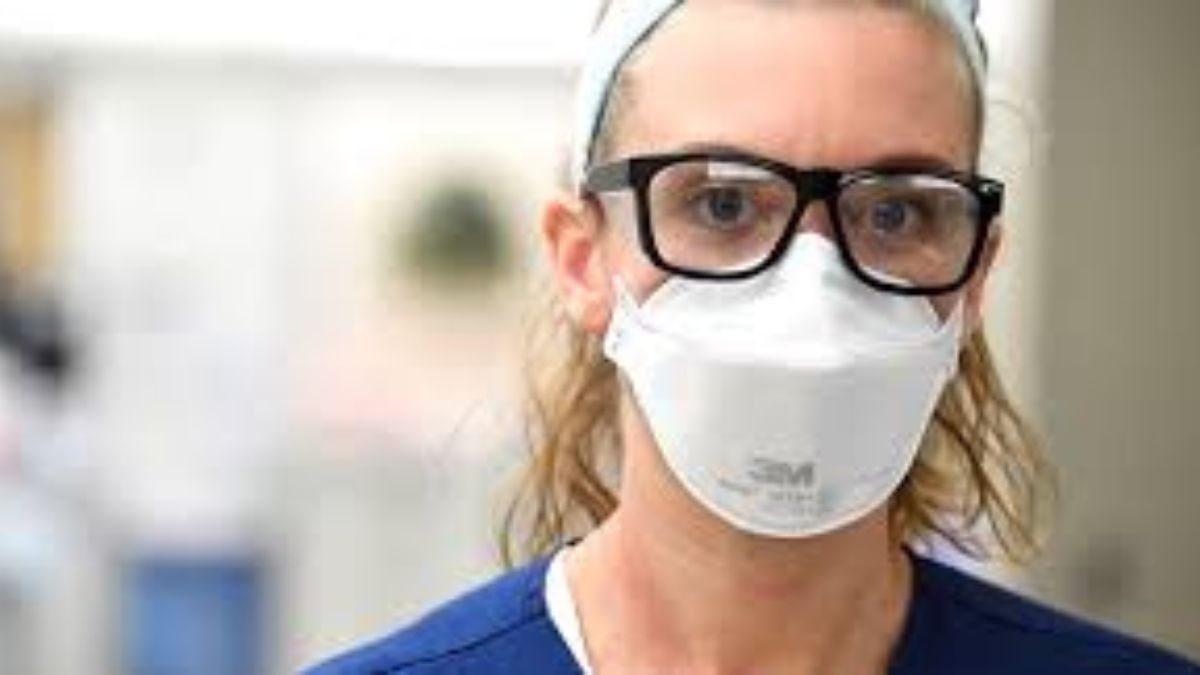
Image Credit: Vital Record Using a specialized ...
news-extra-space

 Is all adaptation we make good for us? Or it is a total bias against our health. Let’s find out.
We may all adopt to use of masks in this certain pandemic. Some of us used to wear this mask before the pandemic and after the effect. They have not changed their habit of using masks after getting the stability of the virus also. Some may fear the Coronavirus, or they are simply using it. Using a mask has its good side and bad side too.
During the pandemic period, USA Surgeon General Jerome Adams advised on Twitter that the public shouldn't wear masks. He wrote that “There is scant or conflicting evidence they benefit individual wearers in a meaningful way,”
Adams' recommendations were in line with those of other US government representatives and the World Health Organization. However, US public health leaders changed their strategy a few days later. A major new analysis that was released in January seemed to conclude that masks remain an unproven strategy for reducing the spread of COVID-19 and other respiratory viruses, sparking a heated debate about whether mask use was a successful pandemic control measure.
The study's principal author, physician, and epidemiologist Tom Jefferson, recently told an interviewer that "There's still no proof that masks are beneficial during a pandemic."
The study has garnered attention in part because it was published by Cochrane, a non-profit organization that seeks to integrate rigorous scientific evidence more directly into the practice of medicine. Many public health experts vehemently disagree with that assertion, however. The group's renowned systematic reviews have an impact on clinical practice all over the world. It's the gold standard for evidence-based medicine, according to Jeanne Noble, a doctor and associate professor of emergency medicine at the University of California, San Francisco. Cochrane was compared to "the Bible" by one epidemiologist.
Also Read: OtoSet Ear Cleaning System: A Unique Way to Keep Your Ears Clean & Healthy
Physical interventions to interrupt or lessen the spread of respiratory viruses" is the title of a new review that is an update of a paper first published in the fall of 2020. It happened to drop while discussions about COVID-19 are still raging among scientists, politicians, and the public.
The Cochrane review served as confirmation for some people. Last week, conservative columnist Bret Stephens claimed that "mask mandates were a bust" in The New York Times. “Those skeptics who opposed mandates and were fiercely derided as cranks and occasionally silenced as misinformers were correct.”
The US Centers for Disease Control and Prevention, which calls masks "a critical public health tool," continues to advise their use. To combat not only COVID-19 but also other respiratory viruses like influenza and RSV this winter, some school districts issued temporary regulations.
Image Credit: Sanford Health News
Is all adaptation we make good for us? Or it is a total bias against our health. Let’s find out.
We may all adopt to use of masks in this certain pandemic. Some of us used to wear this mask before the pandemic and after the effect. They have not changed their habit of using masks after getting the stability of the virus also. Some may fear the Coronavirus, or they are simply using it. Using a mask has its good side and bad side too.
During the pandemic period, USA Surgeon General Jerome Adams advised on Twitter that the public shouldn't wear masks. He wrote that “There is scant or conflicting evidence they benefit individual wearers in a meaningful way,”
Adams' recommendations were in line with those of other US government representatives and the World Health Organization. However, US public health leaders changed their strategy a few days later. A major new analysis that was released in January seemed to conclude that masks remain an unproven strategy for reducing the spread of COVID-19 and other respiratory viruses, sparking a heated debate about whether mask use was a successful pandemic control measure.
The study's principal author, physician, and epidemiologist Tom Jefferson, recently told an interviewer that "There's still no proof that masks are beneficial during a pandemic."
The study has garnered attention in part because it was published by Cochrane, a non-profit organization that seeks to integrate rigorous scientific evidence more directly into the practice of medicine. Many public health experts vehemently disagree with that assertion, however. The group's renowned systematic reviews have an impact on clinical practice all over the world. It's the gold standard for evidence-based medicine, according to Jeanne Noble, a doctor and associate professor of emergency medicine at the University of California, San Francisco. Cochrane was compared to "the Bible" by one epidemiologist.
Also Read: OtoSet Ear Cleaning System: A Unique Way to Keep Your Ears Clean & Healthy
Physical interventions to interrupt or lessen the spread of respiratory viruses" is the title of a new review that is an update of a paper first published in the fall of 2020. It happened to drop while discussions about COVID-19 are still raging among scientists, politicians, and the public.
The Cochrane review served as confirmation for some people. Last week, conservative columnist Bret Stephens claimed that "mask mandates were a bust" in The New York Times. “Those skeptics who opposed mandates and were fiercely derided as cranks and occasionally silenced as misinformers were correct.”
The US Centers for Disease Control and Prevention, which calls masks "a critical public health tool," continues to advise their use. To combat not only COVID-19 but also other respiratory viruses like influenza and RSV this winter, some school districts issued temporary regulations.
Image Credit: Sanford Health News
 The divisive discussion hides a more complicated picture. The answer to the multifaceted question of whether masks "work" involves elements of physics, infectious disease biology, and the behavior of humans. According to many scientists and medical professionals, the Cochrane review's conclusions were, strictly speaking, accurate: High-quality studies known as randomized controlled trials, or RCTs, typically don't demonstrate many benefits for mask wearers.
The question of whether this implies that masks are ineffective, however, is more difficult and has exposed significant differences among public health researchers.
Masks work on a simple premise: If viruses like SAR-CoV-2 or influenza can spread when droplets or larger particles move from one person's nose and mouth into another person's nose and mouth, then erecting a barrier may slow the spread. Additionally, there is evidence to support the claim that some relatively large respiratory droplets can be blocked by surgical masks.
Image Credit: The Washington Post
The divisive discussion hides a more complicated picture. The answer to the multifaceted question of whether masks "work" involves elements of physics, infectious disease biology, and the behavior of humans. According to many scientists and medical professionals, the Cochrane review's conclusions were, strictly speaking, accurate: High-quality studies known as randomized controlled trials, or RCTs, typically don't demonstrate many benefits for mask wearers.
The question of whether this implies that masks are ineffective, however, is more difficult and has exposed significant differences among public health researchers.
Masks work on a simple premise: If viruses like SAR-CoV-2 or influenza can spread when droplets or larger particles move from one person's nose and mouth into another person's nose and mouth, then erecting a barrier may slow the spread. Additionally, there is evidence to support the claim that some relatively large respiratory droplets can be blocked by surgical masks.
Image Credit: The Washington Post
 Researchers test the effectiveness of respirators in the lab. Two mannequin heads were placed in a transparent box for one study, which was published in 2020. To simulate someone exhaling, they piped "a mist of virus suspension" through the mouth of one mannequin while using a nebulizer to deliver the actual SARS-CoV-2 virus. The other mannequin's mouth was filled with air using a ventilator. Finally, they tried different combinations of masks, respirators, or nothing at all on the mannequins to see how much of the virus managed to evade capture as it moved between them. Cloth and surgical masks had some impact, but the N95s, which were able to capture most of the viral particles, performed much better.
Also Read: After completing one medical acquisition, Amazon enters the healthcare sector
However, just because an N95 collects particles in the lab doesn't mean it will always prevent an actual person from becoming infected outside of the lab. People frequently wear respirators incorrectly, which contributes to the problem. Even if the respirator works well, a person may still become ill from the viral particles that get through. In the mannequin study, even a tight-fitting N95 taped to a mannequin's face was unable to fully capture all of the particles.
Complex medical problems like using masks were specifically addressed by Cochrane's methods. The group was founded in 1993 with the goal of "collecting and summarizing the strongest available evidence across practically every field of medicine, with the aim of enabling clinicians to make informed decisions about treatment," according to reporter Daniel Kolitz in a feature for Undark.
Some scientists concur that there is currently insufficient evidence from randomized controlled trials to conclusively demonstrate that using masks and respirators lowers the likelihood of getting sick for the user. However, they contend that RCTs might not actually be the most reliable source of data for determining whether masks offer protection. According to Ben Cowling, an epidemiologist at the University of Hong Kong whose work is referenced in the Cochrane review, “strictly speaking, they're correct that there's no statistically significant effect. However, I believe there is a strong indication that masks can protect people when they wear them when you consider all the evidence.”
Determining what these various pieces of evidence—and evidence gaps—mean for mask mandates can be challenging. Cowling, who oversees the Department of Epidemiology and Biostatistics at the University of Hong Kong School of Public Health, spoke with Undark via Skype from Hong Kong, the authorities up until this week were still enforcing the mask requirement and levying heavy fines on those who failed to cover up in public areas, both indoors and outdoors.
The widespread use of masking during a pandemic surge, he claimed, may help to flatten the curve, and save lives because the evidence is conclusive in support of this. Public health measures are intended for precisely that kind of situation, he said.
Cowling was saddened in that case and cited “Measures have been implemented and maintained in many regions of the world for much longer than necessary.”
Researchers test the effectiveness of respirators in the lab. Two mannequin heads were placed in a transparent box for one study, which was published in 2020. To simulate someone exhaling, they piped "a mist of virus suspension" through the mouth of one mannequin while using a nebulizer to deliver the actual SARS-CoV-2 virus. The other mannequin's mouth was filled with air using a ventilator. Finally, they tried different combinations of masks, respirators, or nothing at all on the mannequins to see how much of the virus managed to evade capture as it moved between them. Cloth and surgical masks had some impact, but the N95s, which were able to capture most of the viral particles, performed much better.
Also Read: After completing one medical acquisition, Amazon enters the healthcare sector
However, just because an N95 collects particles in the lab doesn't mean it will always prevent an actual person from becoming infected outside of the lab. People frequently wear respirators incorrectly, which contributes to the problem. Even if the respirator works well, a person may still become ill from the viral particles that get through. In the mannequin study, even a tight-fitting N95 taped to a mannequin's face was unable to fully capture all of the particles.
Complex medical problems like using masks were specifically addressed by Cochrane's methods. The group was founded in 1993 with the goal of "collecting and summarizing the strongest available evidence across practically every field of medicine, with the aim of enabling clinicians to make informed decisions about treatment," according to reporter Daniel Kolitz in a feature for Undark.
Some scientists concur that there is currently insufficient evidence from randomized controlled trials to conclusively demonstrate that using masks and respirators lowers the likelihood of getting sick for the user. However, they contend that RCTs might not actually be the most reliable source of data for determining whether masks offer protection. According to Ben Cowling, an epidemiologist at the University of Hong Kong whose work is referenced in the Cochrane review, “strictly speaking, they're correct that there's no statistically significant effect. However, I believe there is a strong indication that masks can protect people when they wear them when you consider all the evidence.”
Determining what these various pieces of evidence—and evidence gaps—mean for mask mandates can be challenging. Cowling, who oversees the Department of Epidemiology and Biostatistics at the University of Hong Kong School of Public Health, spoke with Undark via Skype from Hong Kong, the authorities up until this week were still enforcing the mask requirement and levying heavy fines on those who failed to cover up in public areas, both indoors and outdoors.
The widespread use of masking during a pandemic surge, he claimed, may help to flatten the curve, and save lives because the evidence is conclusive in support of this. Public health measures are intended for precisely that kind of situation, he said.
Cowling was saddened in that case and cited “Measures have been implemented and maintained in many regions of the world for much longer than necessary.”
Leave a Reply






